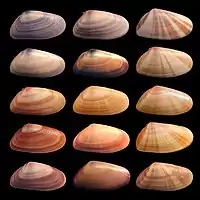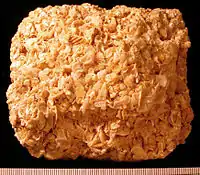coquina
English
WOTD – 15 June 2018
Etymology

Coquina shells (sense 1)

A sample of coquina (sense 2) from Florida, USA
Borrowed from Spanish coquina (“cockle”), from Latin concha (“bivalve, mollusk; mussel”),[1] from Ancient Greek κόγχη (kónkhē, “mussel; shell”). Related to conch and conk.
Pronunciation
- (Received Pronunciation) IPA(key): /kɒˈkiː.nə/
Audio (UK) (file)
- (General American) IPA(key): /koʊˈkiː.nə/, /kɑˈkiː.nə/
- Hyphenation: co‧qui‧na
Noun
coquina (countable and uncountable, plural coquinas)
- (countable) Any of several small marine clams, of the species Donax variabilis, common in United States coastal waters. [from mid 19th c.]
- 1974, Elva D. Sheets, The Fascinating World of the Sea: Circling the Globe for the Wild Seashell, New York, N.Y.: Crown Publishers, →ISBN, page 122:
- The pretty little coquinas (genus Donax, family Donacidae), often called butterfly shells or wedge shells, are distributed throughout the world. Perhaps the most noted species is the small Donax variabilis Say, so commonly found on the beaches of Florida. Coquinas live in droves just beneath the surface of the sand. Collecting coquinas is both a fascinating and tantalizing experience.
- 1995, Ray Dabrowski, editor, Images of Mission: Seventh-day Adventists, People of Faith, Love, Courage, and Hope, Silver Spring, Md.: Communication Department, General Conference of Seventh-day Adventists; Hagerstown, Md.: Review and Herald Publishing Association, →ISBN, page 79:
- They were filled with "coquinas," tiny butterfly-shaped clam shells that gleamed with all the colors of the rainbow. Mario poured the sand and its brilliant treasure into my hands. I stared at the beauty and thought about God, Sabbath, and friends. A few weeks earlier this day had been an ugly thing to me, like the oily sand beneath my feet. Now, like the colorful coquinas, Sabbath had become God's beautiful gift to me and my growing family.
-
- (uncountable, geology) A soft form of limestone made of fragments of shells, sometimes used as a building or road paving material. [from mid 19th c.]
- 1882, “[Appendix] J15. Survey of the North End of Indian River with a View to Its Connection, by the Haulover, with Mosquito Lagoon.”, in Annual Report of the Secretary of War for the Year 1882. In Four Volumes, volume II, part 2 (Appendixes to the Report of the Chief of Engineers, United States Army. (Continued.)), Washington, D.C.: Government Printing Office, OCLC 33315292, page 1230:
- The isthmus is nowhere more than about 8 or 9 feet above the water surface. The top soil is generally sand, with underlying coquina rock—a conglomerate of small broken shells held together by some natural cement.
- 1885, “‘The Town’; ‘Fort Marion’”, in E[dward] H[enry] Reynolds, editor, The Standard Guide to St. Augustine and Fort Marion. Practical Information for Tourists, Descriptions of All Points of Interest; and an Historical Summary, with Maps and Plans. Forty Illustrations from Original Drawings by Roger Davis: Season of 1885–86, Saint Augustine, Fla.: E. H. Reynolds, pages 22 and 50:
- [“The Town”, page 22] In former times, most of the houses were of coquina (a loose shell-stone, quarried on the island opposite [Anastasia Island]), but this material is now almost entirely superseded by wood. Roomy and moder wooden houses may not so picturesque as the weather-stained coquina dwellings they have supplanted, but they are immeasurably more comfortable to live in. […] [“Fort Marion”, page 50] The Fort [Fort Marion, now Castillo de San Marcos] is built of coquina, which in its day was considered a very excellent material for this purpose, since cannon balls would sink into the wall without shattering it as they would harder stone.
-
Derived terms
- coquinoidal
Translations
any of several small marine clams (Donax variabilis)
|
soft form of limestone
|
References
- “coquina”, in Lexico, Dictionary.com; Oxford University Press, 2019–2022.
Further reading
 coquina (geology) on Wikipedia.Wikipedia
coquina (geology) on Wikipedia.Wikipedia  Donax variabilis on Wikipedia.Wikipedia
Donax variabilis on Wikipedia.Wikipedia  Donax on Wikispecies.Wikispecies
Donax on Wikispecies.Wikispecies
Latin
Alternative forms
- cocīna
Etymology
Substantivization of the feminine of coquīnus (“of cooks”, adjective), from coquus (“cook”, noun), from coquō (“cook”, verb). Doublet of popīna.
Pronunciation
- (Classical) IPA(key): /koˈkʷiː.na/, [kɔˈkʷiːnä]
- (Ecclesiastical) IPA(key): /koˈkwi.na/, [koˈkwiːnä]
Noun
coquīna f (genitive coquīnae); first declension (Late Latin)
- cooking; art of cookery
- kitchen
Declension
First-declension noun.
| Case | Singular | Plural |
|---|---|---|
| Nominative | coquīna | coquīnae |
| Genitive | coquīnae | coquīnārum |
| Dative | coquīnae | coquīnīs |
| Accusative | coquīnam | coquīnās |
| Ablative | coquīnā | coquīnīs |
| Vocative | coquīna | coquīnae |
Synonyms
- (kitchen): culīna
Related terms
- coquīnō
- coquīnārius
Descendants
See also cocīna.
- Lombard: cuvina (Vallemaggia)
References
- Walther von Wartburg (1928–2002), “cŏquīna”, in Französisches Etymologisches Wörterbuch (in German), volume 2: C Q K, page 1169
Further reading
- “coquina”, in Charlton T. Lewis and Charles Short (1879) A Latin Dictionary, Oxford: Clarendon Press
- coquina in Charles du Fresne du Cange’s Glossarium Mediæ et Infimæ Latinitatis (augmented edition with additions by D. P. Carpenterius, Adelungius and others, edited by Léopold Favre, 1883–1887)
- coquina in Gaffiot, Félix (1934) Dictionnaire illustré latin-français, Hachette
Sardinian
Noun
coquina (Plural: coquinas)
- Alternative spelling of cochina